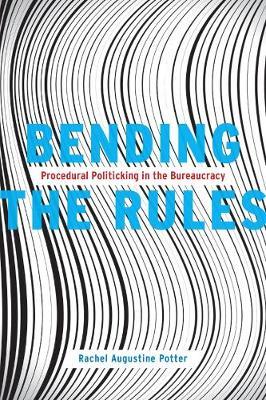Bending the Rules

Bending the Rules
With Bending the Rules, Rachel Augustine Potter shows that rule making is not the rote administrative activity it is commonly imagined to be but rather an intensely political activity in its own right. Because rule making occurs in a separation of powers system, bureaucrats are not free to implement their preferred policies unimpeded: the president, Congress, and the courts can all get involved in the process, often at the bidding of affected interest groups. However, rather than capitulating to demands, bureaucrats routinely employ "procedural politicking," using their deep knowledge of the process to strategically insulate their proposals from political scrutiny and interference. Tracing the rulemaking process from when an agency first begins working on a rule to when it completes that regulatory action, Potter show how bureaucrats use procedures to resist interference from Congress, the President, and the courts at each stage of the process. This influence reveals that unelected bureaucrats wield considerable influence over the direction of public policy in the United States.
PRP: 249.60 Lei
Acesta este Prețul Recomandat de Producător. Prețul de vânzare al produsului este afișat mai jos.
224.64Lei
224.64Lei
249.60 LeiLivrare in 2-4 saptamani
Descrierea produsului
With Bending the Rules, Rachel Augustine Potter shows that rule making is not the rote administrative activity it is commonly imagined to be but rather an intensely political activity in its own right. Because rule making occurs in a separation of powers system, bureaucrats are not free to implement their preferred policies unimpeded: the president, Congress, and the courts can all get involved in the process, often at the bidding of affected interest groups. However, rather than capitulating to demands, bureaucrats routinely employ "procedural politicking," using their deep knowledge of the process to strategically insulate their proposals from political scrutiny and interference. Tracing the rulemaking process from when an agency first begins working on a rule to when it completes that regulatory action, Potter show how bureaucrats use procedures to resist interference from Congress, the President, and the courts at each stage of the process. This influence reveals that unelected bureaucrats wield considerable influence over the direction of public policy in the United States.
Detaliile produsului













